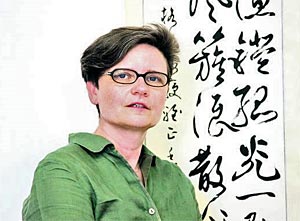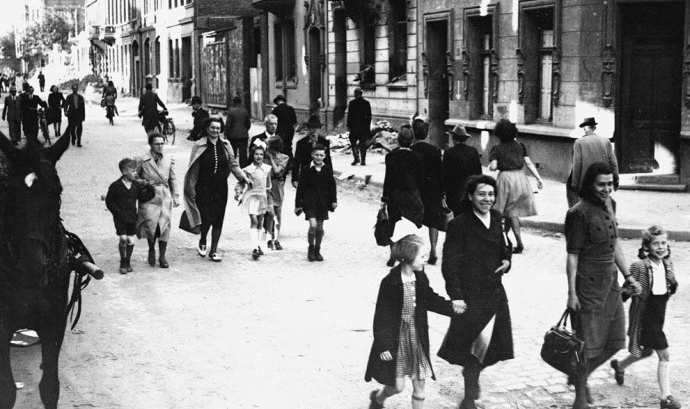Postwar US policy shaped German, Japanese views on WWII crimes

Susanne Weigelin-Schwiedrzik,vice rector at the University of Vienna and a Sinologist

Different from the case in Japan, the US, Great Britain and the USSR agreed to occupy Germany and to urge the Germans to reflect on the war and get further education in 1945. The picture shows on June 6, 1945, German mothers are walking their children to the first school opened by the US military authority after Germany’s surrender.
Susanne Weigelin-Schwiedrzik (1955- ) is now vice rector for Research and Career Development at the University of Vienna. As a Sinologist, her major research interests include modern Chinese and East Asian history, and China's politics and cultural studies. She is a member of the Historical Society of 20th Century China, and also on the editorial board of various journals. Her representative works include Chinese Historiography in Comparative Perspective.
The year 2015 marks the 70th anniversary of the Second World War. While both countries were Axis powers, Germany and Japan demonstrated different attitudes toward their war crimes. How have Germany's reflections on the war evolved over time, and why has Japan not followed a similar trend? Focusing on both the interior and exterior factors, a CSST reporter in London talked with Weigelin-Schwiedrzik.
CSST: You wrote that Germany's reflection on the war changed over time, so what have been the key elements in this process?
Weigelin-Schwiedrzik: First there were interior factors. Right after the war, some intellectuals in Germany pointed out that the Germans should realize that those who were directly involved in Hitler's wartime crimes must plead guilty, and that those who did not get involved directly should also be held responsible for not having overthrown the Third Reich. Such recognition was gradually established in the scholarship in the Federal Republic of Germany (FRG). On the 40th anniversary of the Second World War in 1985, Richard von Weizsäcker, then the President of FRG, delivered a speech that summarized the consensus on how to look at the Third Reich. As a result of four decades of debate, this indicated that a consensus had been reached within FRG on their reflections on Germany's war crimes.
Exterior factors also played an essential role. After the war, occupying powers of Western Germany headed by the US managed to include FRG in the process of European integration. As such, FRG could gain economic development but could not violate the interests of its neighboring nations. It had to coexist harmoniously with its neighboring nations. FRG therefore took various measures and explained to the nations that it had formerly occupied as well as its one-time foes that it pleaded guilty to the war crimes and would never invade other European nations. Such policy of retrospection was actually consistent with its economic interests. The German Democratic Republic, on the other hand, became a part of the socialist camp led by the USSR (Union of Soviet Socialist Republics) and drew a clear line between itself and the Third Reich.
CSST: Please elaborate more on the impact of the US postwar policy on Germany.
Weigelin-Schwiedrzik: The US began to design postwar settlement in Germany around 1942 to 1943. "The US Proposal for the Treatment of Germany" in 1943, among others, played the most significant role. It clarified that the main purpose of occupying Germany was to lay the foundation for democracy. To achieve this goal, the US decided to adopt four measures—denazification, demilitarization, decentralization and decartelization—among which denazification exerted the greatest influence on Germany's historical reflections.
To facilitate denazification, the US adopted both legal and institutional methods. The legal method was carried out through the Nuremberg Trials. The institutional method meant that the US made a list of the supporters of the Nazi regime and forced them to leave their jobs so that they would no longer be able to get involved in politics.
CSST: After all the measures, how did the German public's understanding of the war evolve over time?
Weigelin-Schwiedrzik: Germany's wartime crimes revealed during the Nuremberg Trials did not recall a critical memory among the majority of the German public. At that time, the general public did not hold themselves responsible for the crimes as active participants in and supporters of the Third Reich.
Rather, after they realized the crimes the German nation and forces had committed, the public felt they trusted and supported the regime because they had been deceived. They therefore deemed themselves as victims rather than war criminals.
Back in the 1950s, Germany had already emphasized the need to foster good relationships with its neighbors, and some experts had begun to discuss with neighboring nations how to narrate the war in the textbooks. The teachers at that time, however, did not actively reveal detailed information about the Third Reich to their students. They experienced the war themselves and were not willing to tell the next generations what they had done under Hitler's reign.
The aforementioned situation was challenged by the first generation that grew up after the war, who began to raise fierce criticism and opposition in the 1960s. The new generation did not experience the war nor did they support Hitler or participate in his crimes. To this day, that new generation still believes that were it not for their efforts, the Germans would never have examined their past with a critical attitude.
CSST: Compared with Germany, the case in Japan is quite different. What interior factors have contributed to the attitudes in Japan?
Weigelin-Schwiedrzik: Compared with Germany, Japan still has scattered memories, even extremely contrary ideas of the war. No consensus has ever been reached. One important reason is that there is still a distinct division between the left-wing and right-wing intellectuals in Japan.
Another reason may be the different circumstances under which they surrendered. Germany agreed to surrender unconditionally after Hitler had committed suicide, while in Japan, the Mikado agreed to do so only after the atomic bombings. Such divergence cannot be neglected. The Japanese public deemed themselves as victims of the war because of the atomic bombings, believing that they did not need to reflect on Japan's wartime crimes since they had been collectively punished by the atomic bombings. As it is still on debate today whether it had been necessary for the US to drop atomic bombs in Japan to end the war, the Japanese believe that they do not need to change completely their attitude as victims.
CSST: What exterior factors caused such difference between the two nations? Is it mainly because of differential treatment on the part of the US?
Weigelin-Schwiedrzik: At the two conferences in 1945, the US, Great Britain and the USSR agreed to occupy Germany and to urge the Germans to reflect on the war and get further education.
The case in Japan was not the same. When it began to design the postwar settlement, the US did not distinguish Japan from Germany. After the war, however, the US policies toward the two nations showed distinct difference. This exerted significant influence on how the intellectuals in Germany and Japan reflected on their nation's wartime history, which is a significant reason why the two have shown different attitudes toward the war.
The American government has never apologized to the Japanese for the atomic bombings, nor did they admit that the Japanese people were the victims of the Second World War. However, the US government stressed that the Japanese people were victims of Japan's militarism. As such, the Americans had a totally different definition of the Japanese than that of the Germans. The US felt it was necessary to rebuild the national institution in Germany but showed another attitude to Japan. The Mikado was not abolished in Japan nor did Japan go through a process as severe as the Nuremberg Trials.
Jiang Hong is a reporter at the Chinese Social Sciences Today.

 PRINT
PRINT CLOSE
CLOSE